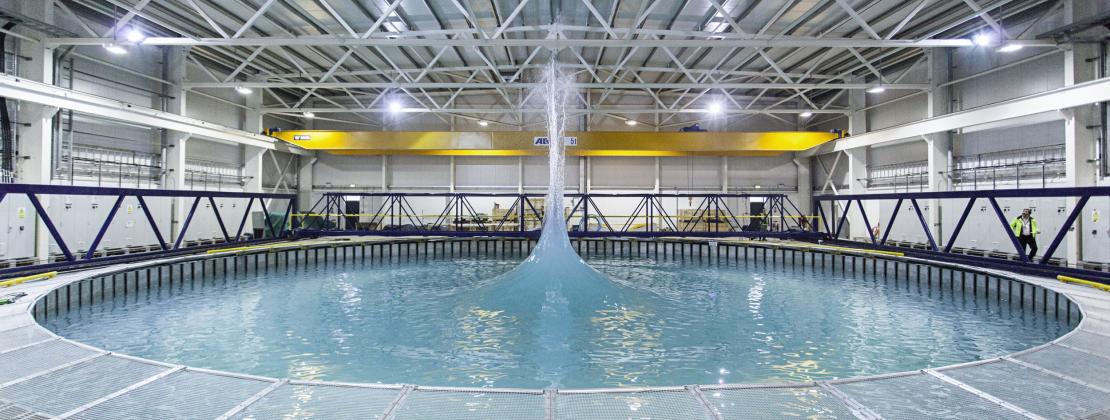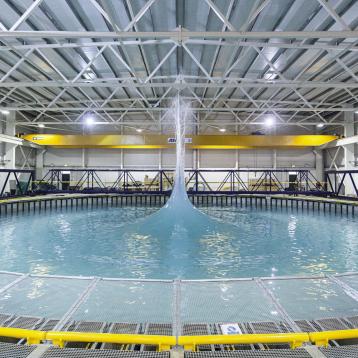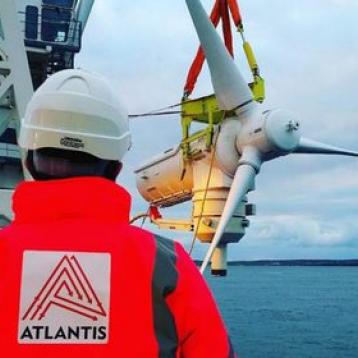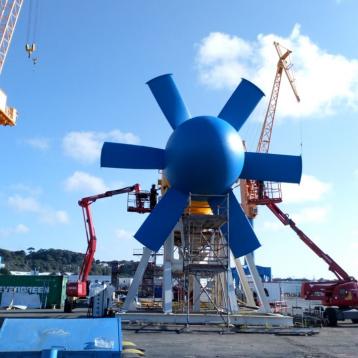- Home
- ERPE Research Challenges
- Energy and Resource Management
Energy and Resource Management

The UK and many other countries have set ambitious targets to address the climate emergency by reducing carbon flows in the energy supply chain and reprocessing and storage of CO2. The energy trilemma is that future energy supplies must be secure, affordable and environmentally sustainable. The ERPE brings together 75 researchers in the Energy and Resource Management theme (ERM) with the conjoined ambition of delivering new technologies, processes and policy-informing analysis that will underpin a faster transition to lower carbon, more sustainable future.
ERM researchers are driving positive change at critical strategic points along the renewable and carbon-based energy chain; this includes:
- quantifying and characterising the natural energy resources of the wind, tidal currents, ocean waves and oil & gas reserves;
- discovering and deploying technologies to improve their extraction, conversion and delivery via the electricity networks or oil & gas grids;
- developing technologies and processes that reduce end-use demand for energy, enable substitution of lower-carbon supplies, and capture and store some of the ultimate atmospheric emissions from the energy system; and
- collaborating to innovate policy advice that aims to ensure that the roll-out of technologies and behavioural changes are socially, environmentally and economically sustainable.
Key groupings of staff deliver impact in Offshore Renewable Energy GeoEnergy Engineering Energy Conversion and Delivery Decarbonisation of the Energy System and Energy Technology and Policy Innovation.
Offshore Renewable Energy
The UK has some of the best offshore wind, tidal and wave energy resources (ORE) worldwide. It leads the world to deploy and demonstrate tidal and wave energy technologies, underpinned by industrially- and academically-collaborative research and innovation. ERM staff have partnered in most UK and EU flagship investments in ORE research and innovation for the last 20 years. We work with a worldwide network of partners to develop new technologies, processes, instrumentation, know-how, and professional capacity for offshore wind, tidal, and wave sectors.
They operate in world-unique facilities, including the FloWave Ocean Energy Research Facility and FASTBLADE, opening 2021 as the world’s first full-scale accelerated tidal turbine blade fatigue test facility. At sea, ERM staff are pioneering real-time steerable instrumentation to measure and characterise tidal energy flow from array to device scales.
The breadth of research developed through these institutes places us in a unique position encompassing all aspects of the energy cycle; from resource exploration and exploitation to diversification of efficient production. This focus has enabled the development of methods and technologies to reduce and mitigate the impact of CO2 emissions across all aspects of energy and resource management, such as the integration of energy micro-technologies into macro-systems and the harvesting and conversion of energy.
Our researchers have produced innovations in smart materials, smart devices with the exploitation of their applications in smart vehicles, smart buildings, smart cities, smart grids up to a complete smart infrastructure. We develop the science and engineering of extracting, converting and conserving energy from novel sources in novel ways. Sources of energy include more tradition renewable from solar, and wind to more exotic such as bacteria and biomass, including a newer thermoelectric conversion process. Storage of energy through electrochemical and solar thermal routes and combining the energy efficiency schemes are also explored through front line research efforts.
ERPE has strengthened its engagement with governmental organisations in the UK and internationally, providing a strong focus on both technology development and supporting policy. The policy, economics and innovation research allows the ERPE to deliver truly interdisciplinary research that covers all aspects of energy systems.
Renewable Energy and Coastal Engineering
Much of the ERPE work in this area supports the development of marine energy resources. These include developing solutions to the technical difficulties posed by connecting marine renewables in wave, tidal and offshore wind to networks, improving its competitiveness (Power Systems), and developing alternative energy vectors to help the power system harness variable renewables. Extensive testing is undertaken using the facilities within the ERPE.
This research conducts world-class fundamental and applied research that assists the marine energy sector in the UK, addressing key questions for marine energy's present and future. Studying large scale interactive coupled 3D modelling for wave and tidal energy resource and environmental impact has allowed us to develop technology for device and environmental monitoring. Marine energy generation in very deep water environments focuses on research for new materials for marine energy generation and resource prediction for very short timescales (hours).
Energy Storage, Carbon Capture and Climate Change
Securing clean, affordable and sustainable energy for the future is vital – and the ERPE believes that carbonate reservoirs could hold the solution to this. The possibility of storing huge volumes of carbon dioxide within these reservoirs, or producing significant gas and geothermal heat, is tremendously important as we transition to a low carbon society.
We are developing technologies that will allow scientists to extract energy – in the form of oil, gas, or geothermal heat – from carbonate reservoirs more effectively to improve energy security for the future and reduce global carbon emissions, especially if energy production is combined with CO2 injection. We study how fluids and minerals interact with each other within a single pore of a carbonate rock – and predict how fluids travel across many kilometres in the reservoir as a whole.
We are currently combining 3D printing with lab experiments and simulations to provide fundamental new insights into how oil, gas and water flow in carbonate rocks.
Carbon capture and storage, combined with oil and gas production or hydrogen generation, can create almost carbon-neutral energy supplies.
Understanding the interactions between energy generation and climate is crucial to providing a resilient and secure energy supply in the future. ERPE researchers are internationally acclaimed in this field of study. We develop technologies for low carbon energy sources like marine, wind, and hydropower and enhance their contribution by managing variability through network-friendly machines and energy storage.
A further focus is to analyse all aspects of the power system's carbon footprint to reduce the carbon emissions associated with energy use.
Energy Policy, Economics and Innovation
Our Energy Policy, Economics and Innovation research addresses the economic and policy aspects of energy systems, combining expertise on applied economics, innovation theory, energy system organisations and institutions, and the wider policy and regulatory context of energy. This partnership nurtures world leading expertise and the deployment of technologies on the wider environment.
The Policy, Economics and Innovation research theme operates alongside all other themes, uniquely allowing the team to deliver truly interdisciplinary research covering all aspects of energy systems.
It applies a range of quantitative and qualitative research tools and methods including optimisation based market modelling, equilibrium modelling, road mapping, innovation systems, scenario analysis, transitions management and agent-based modelling.
These tools allow us to advise our partners, including the Scottish and UK Governments and many private sector organisations.
Applied Superconductivity
Superconductivity is broadly recognised for its contribution to solving key research and societal challenges in Energy and Healthcare sectors. This theme includes research into the synthesis, characterisation and understanding of superconducting materials, and the design, modelling and testing of superconducting devices.
Superconductors that carry electricity with no resistance can develop super efficient devices, such as power cables and electric machines. These devices will greatly support the energy system's reform by diversifying supply and weaning the world away from fossil fuels, providing opportunities for secure, affordable and low-carbon energy. Superconductors also underpin a healthy industrial base of medical imaging and acceleration instrumentation.
This research theme focuses on high-temperature superconductors and their applications in both Energy and Healthcare sectors, such as power generators, power cables, fault current limiters, energy storage, accelerators, and magnetic resonance imagery. We also explore superconductors' novel applications such as superconducting wireless power transmission and superconducting fast charging for electric vehicles.
The ERPE is dedicated to researching solutions that respond to the climate emergency.
The ERPE is committed to the vision that Edinburgh should be the data capital of Europe. With the breadth of knowledge across the ERPE, this target is achievable.
ERPE has been at the forefront of various transport research.
Read about how our researchers are helping to shape government decisions.
ERPE research has proved to be high value and high impact in the transitioning to using cleaner, greener and renewable energy systems.





